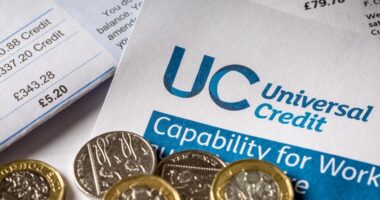THE UK economy has fallen by 0.1% as fears over a looming recession grow amid a crippling cost of living crisis.
Official figures show that the gross domestic product (GDP) fell by 0.1% in March.
And estimates from last month have been revised down as well.
ONS experts said the economy inched up by just 0.1% in February – but they marked this down today to no growth.
The Office for National Statistics (ONS) measures GDP monthly and it shows if the economy is growing or not.
It’s important because a higher rate of growth means there will more likely be an increase in jobs of offer, pay rises, and more money to invest in keeping the country up and running.


A fall in the services sector was the main reason for the shrink in March, decreasing by 0.2%, the ONS said.
The wholesale sector – which include companies who sell large amounts of goods to retailers at low prices – and retail too fell by 15.1%.
But overall GDP on a monthly basis is now 1.2% above its pre-Covid level in February 2020.
However, the UK economy did increase slightly for the first quarter of the year – between January to March – up by 0.8%.
Most read in Money
That is still lower than what economists were predicting. Experts estimated that the economy would grow by 1% over the first three months of the year.
Darren Morgan, director of economic statistics at the ONS, said: “Our latest monthly estimates show GDP (gross domestic product) fell a little in March, with drops in both services and in production.”
He added that looking at the first three month of the year, the UK economy’s slight growth was “the lowest for a year”.
It comes as fears are growing over a possible recession.
Experts have predicted that economic growth will slow this year as inflation rockets and the cost of energy, fuel, food and transport goes up.
The government’s Office for Budget Responsibility cut its forecast for growth in 2022 to 3.8%, down from its previous forecast of 6%, set in October.
While the Bank of England warned that inflation could hit an eye-watering 10% within months.
And in a further blow to household finances, interest rates also went up to 1% – adding £612 a year to mortgages.
Quilter Investors portfolio manager Hinesh Patel said “things are only going to get worse for consumers” as the cost of living crisis gathers pace.
He added: “Energy bills are expected to soar again later this year when the price cap is reassessed, while inflation is proving stickier than expected.
“The Bank of England has a near impossible task of managing the economy out of this quagmire.”
Investment platform Bestinvest personal finance analyst Alice Haine warned of “the scale of the challenge” households face as costs spiral.
“With less money in the pockets of everyday workers, keeping a lid on spending is becoming a daily battle for many households.
“As consumers tighten their belts – cutting out extras from their budgets such as Netflix subscriptions, overseas travel or meals out – the drop in expenditure will eat further into GDP growth.”
How to protect your finances
As millions battle against rising prices, you’ll want to know how to buffer your budget against the squeeze.
You might be entitled to benefits without realising – charity Turn2us has estimated that at least 7 million people are missing out on a massive £15billion.
You can check by using an online benefits calculator, which are offered by charities such as Turn2Us and EntitledTo.
As energy bills soar, you might be eligible for help from your supplier.
Many run their own schemes offering help, or have charitable trusts to help pay arrears.
British Gas Energy Trust, for example, runs a scheme where anyone can apply for a grant, and you don’t even have to be a customer.
Other firms that offer grants just to their customers include:
Your local council might be able to help you out with free cash, furniture, food vouchers or money for energy bills under a number of help schemes.
Struggling families can apply for cash and grants for furniture, bills and food up to £1,000 under the welfare assistance scheme. Some councils don’t have a scheme though.


While the Household Support Fund can also help with the cost of household essentials and bills, and you could get up to £1,500.
For both help schemes, you’ll need to contact your local council for more information – and exactly what help you can get is usually determined on a case-by-case basis.
We pay for your stories!
Do you have a story for The Sun Online Money team?









